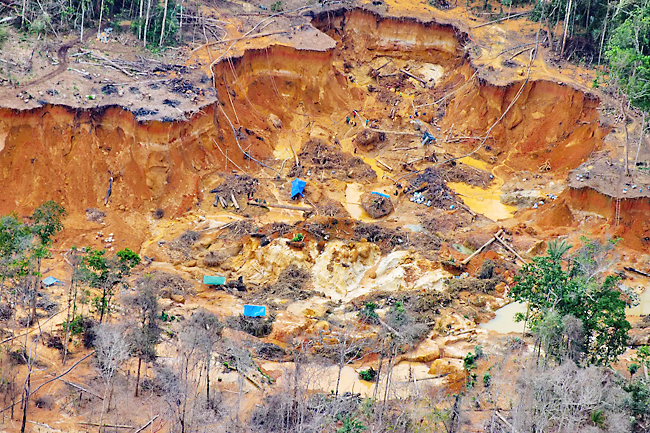RIO DE JANEIRO (AFP) – Brazil’s biggest indigenous reservation turns 30 years old on Wednesday, but inhabitants of the Yanomami territory say the killing, rape and poisoning of their people by illegal gold miners means there is little to celebrate.
Located in the Amazon along the Brazil-Venezuela border, the Yanomami Indigenous Territory – a swathe of jungle bigger than Portugal — was established on May 25, 1992, after a decades-long battle.
But what could have been a commemoration of a landmark in the movement to protect the rainforest and its inhabitants is instead serving as a snapshot of the nightmare playing out there – with the complicity, activists say, of President Jair Bolsonaro.
According to indigenous leaders, more than 20,000 illegal gold miners have invaded Yanomami territory, killing indigenous inhabitants, sexually abusing women and girls, and contaminating rivers with the mercury used to separate gold from sediment.
The miners, known as “garimpeiros,” are also spreading malaria, tuberculosis and Covid-19 on the reservation, home to an estimated 29,000 people, counting the Yanomami, the Ye’kwana and several isolated groups.
The result is devastating for populations with limited immunity to outside diseases.
“Thirty years ought to be cause for indigenous peoples to come together and celebrate,” said head of the Association of Brazil’s Indigenous Peoples (APIB) Sonia Guajajara.

“Instead, we have this violence and destruction, with the collusion of the state,” she told AFP.
The reservation is not Brazil’s first, but it is the biggest, at 96,000 square kilometres, and helped pave the way for another 725 indigenous territories, covering 13.8 per cent of the country in all.
In a world racing to curb climate change, the stakes go far beyond the Yanomami.
A slate of studies show protecting indigenous peoples is one of the best ways to save the world’s carbon-absorbing forests.
Known for their body paint, intricate piercings and warrior spirit, the Yanomami are traditionally semi-nomadic hunter-gatherers who live in collective huts called “shabonos.”
Their encounter with the garimpeiros is a clash of two worlds.
The miners, who have links to drug gangs, bring in helicopters, heavy machinery, generators, satellite internet, alcohol and drugs.
The Hutukara Yanomami Association (HAY) reported last month the miners are using, drugs, food and trinkets to lure the Yanomami, then abusing women and girls.
There have been several reports of armed miners killing Yanomami inhabitants.
“We’re suffering. The garimpeiros are assaulting Yanomami women and children. They’re killing us and polluting the water,” said Yanomami health worker and activist Mauricio Yanomami, 35.
“The forest needs peace. It’s suffering too. The Earth is suffering.”
Fuelled by high gold prices, the area scarred by illegal mining on the Yanomami reservation surged by a record amount last year, to 32.7 square kilometres, the biggest annual increase since monitoring began in 2018, said the report from HAY.
Across the Brazilian Amazon, mining destroyed a record 125 square kilometres last year, according to government figures.
The reservation was created partly in response to wildcat miners in the 1980s, who brought malaria and violence that killed an estimated 20 per cent of the Yanomami population in seven years.
Activists who fought to create the reservation said the situation now is worse. Unlike the 1980s, today’s miners are organised and well-funded, with heavy equipment and a network of clandestine airstrips.
They also have Bolsonaro, a self-described garimpeiro supporter whose government has pushed to open indigenous lands to mining.
“The Bolsonaro government have done everything possible to undermine and destroy indigenous rights and environmental legislation. They’ve declared war,” said research director at indigenous-rights group Survival International Fiona Watson.
The president’s office did not respond to requests for comment.
“It’s a genocide,” said Catholic missionary Carlo Zacquini, an 85-year-old Italian who helped fight to establish the reservation starting in 1968.


